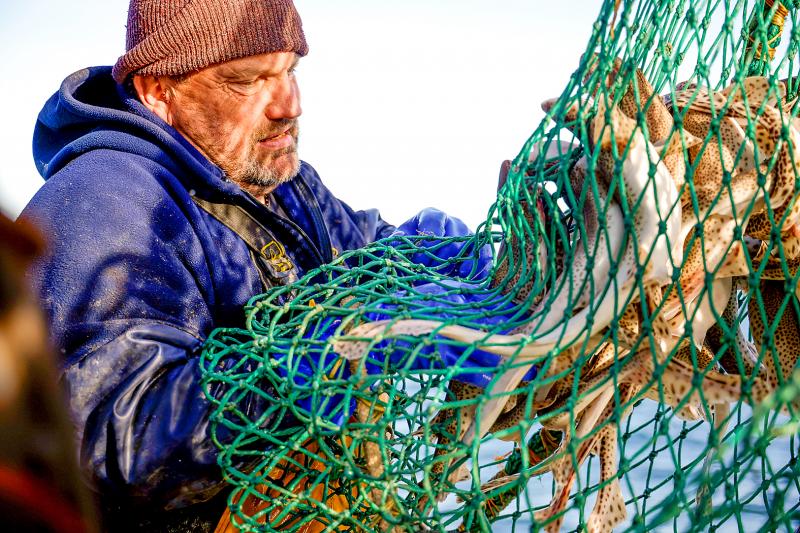A coalition of non-governmental organizations (NGO) is calling for an urgent ban on destructive bottom trawling in EU marine protected areas, after the failure of member states to defend seas.
The ban is part of a 10-point action plan to “raise the bar” to achieve biodiversity targets, which they say will not be met by current promises, such as last year’s high-profile pledge by world leaders at the UN summit on biodiversity in New York to reverse nature loss by 2030.
A raft of EU laws to safeguard marine life — including a duty on EU member states to achieve “good environmental status” in seas by last year, to achieve healthy ecosystems and to introduce sustainable fisheries management — have not been enforced, said the coalition, which includes Oceana in Europe, Greenpeace and ClientEarth.

Photo: Bloomberg
They said this failure, combined with existing pressures on Europe’s seas, including climate change, risks triggering irreversible changes to the ecological conditions under which humanity has evolved and thrived.
The 10-point call to action, which the coalition is to present to EU leaders, lawmakers and member states, follows the commitment of European Commission President Ursula von der Leyen and many EU heads of state or government to reverse biodiversity loss by 2030.
The call was published in response to a European Parliament draft report on the EU’s biodiversity strategy for 2030.
That draft report, which is to be presented to the environment committee on Thursday, expresses strong regret that the EU has “neither fully met the 2020 biodiversity strategy objectives nor the global Aichi biodiversity targets.”
While the NGOs welcomed the draft report, they said it does not go far enough to ensure enforcement of current EU laws or to set action plans to reverse biodiversity loss by 2030.
“The EU has failed to achieve good environmental status for EU seas and the EU biodiversity strategy must be implemented if we are to have a chance of saving it — this implementation needs to include the 10 action points we have in our report,” said Rebecca Hubbard, program director of Our Fish, which aims to end overfishing.
The EU has also failed to end overfishing and to protect marine habitats from bottom trawling, she said.
“What we really need to do is go from strategies and goals and action and outcomes. National pledges, goals and agreements are important for setting a direction but if we are going to save the planet we need action,” she added.
The 10-point action plan calls for a network of fully and highly protected ocean sanctuaries covering at least 30 percent of the oceans by 2030 and a drastic improvement in fisheries protections.
It urges the EU to commit resources to dramatically ramp up, implement and enforce existing legislation to safeguard marine life.
The coalition calls on the EU to carry out environmental impact assessments of fishing activities, to set fishing limits with “precautionary buffers” for climate change and mandatory remote monitoring systems for all fishing fleets.
It calls for measures to mitigate bycatch and for protections of the deep sea, such as closing sensitive areas to hydrocarbon exploration, and for an end to harmful fishing subsidies and controls on underwater noise.

‘IN A DIFFERENT PLACE’: The envoy first visited Shanghai, where he attended a Chinese basketball playoff match, and is to meet top officials in Beijing tomorrow US Secretary of State Antony Blinken yesterday arrived in China on his second visit in a year as the US ramps up pressure on its rival over its support for Russia while also seeking to manage tensions with Beijing. The US diplomat tomorrow is to meet China’s top brass in Beijing, where he is also expected to plead for restraint as Taiwan inaugurates president-elect William Lai (賴清德), and to raise US concerns on Chinese trade practices. However, Blinken is also seeking to stabilize ties, with tensions between the world’s two largest economies easing since his previous visit in June last year. At the
Nearly half of China’s major cities are suffering “moderate to severe” levels of subsidence, putting millions of people at risk of flooding, especially as sea levels rise, according to a study of nationwide satellite data released yesterday. The authors of the paper, published by the journal Science, found that 45 percent of China’s urban land was sinking faster than 3mm per year, with 16 percent at more than 10mm per year, driven not only by declining water tables, but also the sheer weight of the built environment. With China’s urban population already in excess of 900 million people, “even a small portion

UNSETTLING IMAGES: The scene took place in front of TV crews covering the Trump trial, with a CNN anchor calling it an ‘emotional and unbelievably disturbing moment’ A man who doused himself in an accelerant and set himself on fire outside the courthouse where former US president Donald Trump is on trial has died, police said yesterday. The New York City Police Department (NYPD) said the man was declared dead by staff at an area hospital. The man was in Collect Pond Park at about 1:30pm on Friday when he took out pamphlets espousing conspiracy theories, tossed them around, then doused himself in an accelerant and set himself on fire, officials and witnesses said. A large number of police officers were nearby when it happened. Some officers and bystanders rushed

Beijing is continuing to commit genocide and crimes against humanity against Uyghurs and other Muslim minorities in its western Xinjiang province, U.S. Secretary of State Antony Blinken said in a report published on Monday, ahead of his planned visit to China this week. The State Department’s annual human rights report, which documents abuses recorded all over the world during the previous calendar year, repeated language from previous years on the treatment of Muslims in Xinjiang, but the publication raises the issue ahead of delicate talks, including on the war in Ukraine and global trade, between the top U.S. diplomat and Chinese